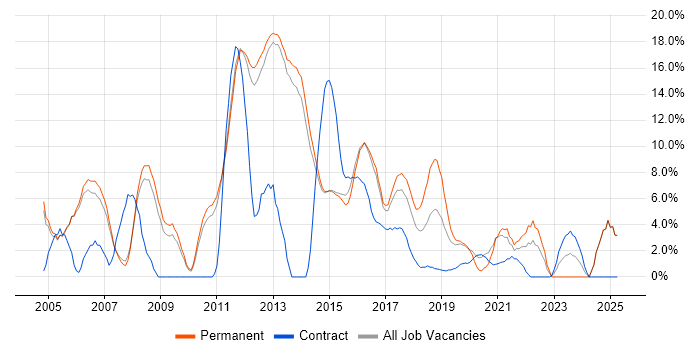Transact-SQL
Manchester > Bolton
The table below provides summary statistics for permanent job vacancies advertised in Bolton requiring T-SQL skills. It includes a benchmarking guide to the annual salaries offered in vacancies that cited T-SQL over the 6 months leading up to 4 May 2025, comparing them to the same period in the previous two years.
| 6 months to 4 May 2025 |
Same period 2024 | Same period 2023 | |
|---|---|---|---|
| Rank | 39 | - | - |
| Rank change year-on-year | - | - | - |
| Permanent jobs citing T-SQL | 3 | 0 | 0 |
| As % of all permanent jobs advertised in Bolton | 2.03% | - | - |
| As % of the Programming Languages category | 27.27% | - | - |
| Number of salaries quoted | 3 | 0 | 0 |
| 10th Percentile | - | - | - |
| 25th Percentile | £37,500 | - | - |
| Median annual salary (50th Percentile) | £40,000 | - | - |
| 75th Percentile | £45,625 | - | - |
| 90th Percentile | £47,500 | - | - |
| Manchester median annual salary | £50,000 | £47,500 | £52,000 |
| % change year-on-year | +5.26% | -8.65% | +4.00% |
All Programming Languages
Bolton
T-SQL falls under the Programming Languages category. For comparison with the information above, the following table provides summary statistics for all permanent job vacancies requiring coding skills in Bolton.
| Permanent vacancies with a requirement for coding skills | 11 | 30 | 87 |
| As % of all permanent jobs advertised in Bolton | 7.43% | 28.85% | 54.04% |
| Number of salaries quoted | 8 | 16 | 8 |
| 10th Percentile | £35,100 | £34,375 | £36,250 |
| 25th Percentile | £37,500 | £39,688 | £38,875 |
| Median annual salary (50th Percentile) | £45,000 | £46,250 | £47,500 |
| Median % change year-on-year | -2.70% | -2.63% | -5.00% |
| 75th Percentile | £48,750 | £55,000 | £53,000 |
| 90th Percentile | £49,875 | £65,000 | £54,725 |
| Manchester median annual salary | £65,000 | £57,000 | £57,810 |
| % change year-on-year | +14.04% | -1.40% | +5.11% |
T-SQL
Job Vacancy Trend in Bolton
Job postings citing T-SQL as a proportion of all IT jobs advertised in Bolton.

T-SQL
Salary Trend in Bolton
3-month moving average salary quoted in jobs citing T-SQL in Bolton.
T-SQL
Co-occurring Skills and Capabilities in Bolton by Category
The follow tables expand on the table above by listing co-occurrences grouped by category. The same employment type, locality and period is covered with up to 20 co-occurrences shown in each of the following categories:
